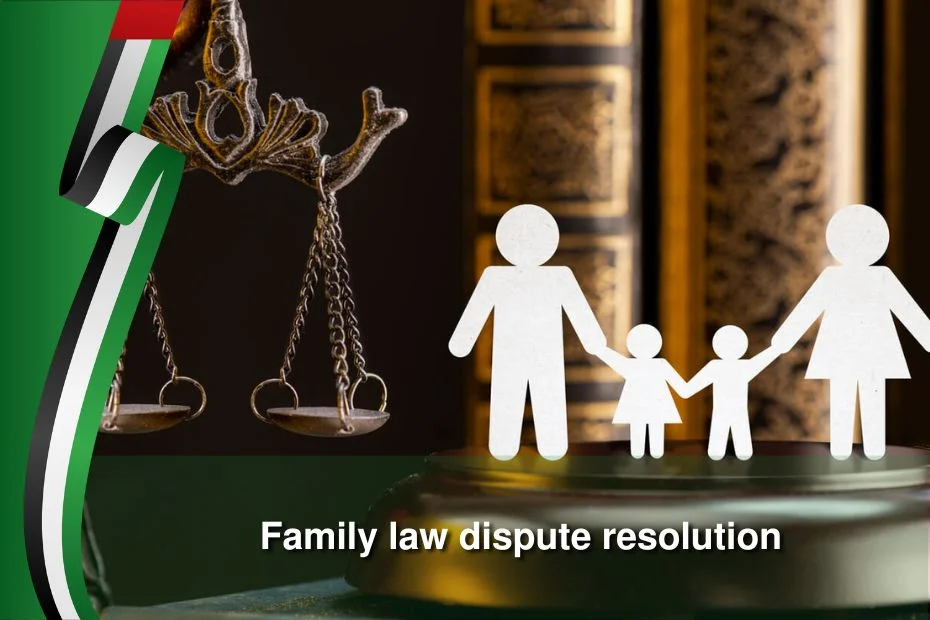Family law dispute resolution in Dubai is governed by a blend of Islamic law and civil legal frameworks, with the UAE Personal Status Courts playing a central role.
Whether involving divorce, child custody, inheritance, or property disputes, families in Dubai must deal with these laws and dispute resolution processes.
This article explores how family law disputes are resolved in Dubai.
Additionally, we highlight the legal services provided by Al Mulla Lawyers and Legal Consultants, focusing on their expertise in handling family law matters efficiently and confidentially in 2025.
Contact our expert lawyers & legal consultants in UAE. Click the WhatsApp icon below.
Table of Contents
Family Law Dispute Resolution in Dubai Legal System
Family dispute resolution in Dubai involves a complex legal system incorporating Islamic law (Sharia) and civil law.
The UAE Personal Status Courts handle family law cases involving marriage, divorce, child custody, inheritance, and property disputes.
For Muslim families, these disputes are often resolved following Personal Status law and Sharia law.
At the same time, non-Muslim expatriates follow civil family laws, as outlined in Federal Law No. 41 of 2022, which came into effect in 2023.
This law provides clearer procedures for marriage, divorce, and child custody for non-Muslims, ensuring the application of laws from the country of the marriage’s origin when necessary.
Dispute resolution can occur through the Family Guidance Department or court proceeding.
Child custody cases governed by Federal Decree-Law No. (41) of 2024 on Personal Status Law. This law asserts that custody is a child’s right, initially shared by both parents during marriage.
Upon separation, primary custody is awarded to the mother. In cases where alternative guardianship is necessary, there is a hierarchy: first, the father; then, the maternal and paternal grandmothers.
Ultimately, the court has the discretion to make decisions based on the child’s best interests.
In another scope of application, Federal Decree-Law No. (41) of 2022 on Civil Personal Status establishes the principle of joint custody, giving both parents equal rights over their minor child until the child reaches 18.
After that age, the child can make their own custody decisions.
Disputes concerning inheritance are resolved in accordance with Personal Status Civil Personal Status laws.
federal Decree-Law No. (41) of 2024 (New UAE Personal Status Law) outlines inheritance in three forms: fixed shares (Fard), agnates (Al-Taa’seeb), and uterine relatives (Rahem).
Fixed shares are those defined by Sharia for specific heirs, while agnates are shares not fixed by Sharia. Uterine relatives refer to those linked through the maternal line.
In contrast, Federal Decree-Law No. (41) of 2022 on Civil Personal Status applies a different framework for inheritance.
When no will is present, the surviving spouse is entitled to half of the inheritance, with the other half being equally divided among the children, regardless of gender.
Legal Services in Family Law Dispute Resolution
Our law firm in UAE specialize in family law dispute resolution in Dubai, offering legal representation in divorce cases, child custody disputes, inheritance issues, and property settlements.
Their legal team guides the process and assists with court representation if disputes escalate.
They ensure confidentiality and personalized strategies tailored to each case, whether Islamic or civil family law for expatriates.
By focusing on negotiation and amicable solutions, Al Mulla Lawyers help minimize the emotional and financial stress associated with family law disputes in Dubai, ensuring that clients are fully supported throughout the legal process.
Read about the Best Family Lawyer in Dubai. Find expert Family Lawyers for Child Visitation in Dubai.
FAQs about family conflict resolution in Dubai
Conclusion.
Navigating family law disputes in Dubai requires a clear understanding of Islamic and civil legal systems.
Legal guidance is crucial for ensuring fair outcomes, particularly in sensitive matters like child custody and inheritance.
Al Mulla Lawyers and Legal Consultants offer specialized services in family law dispute resolution, ensuring that clients receive expert legal representation and support, whether inside or outside the courtroom.
Contact our law firm in UAE for expert help. Click the Whatsapp icon below.
Omar Al Mansoori is an Emirati legal advisor and researcher with over 10 years of experience in civil, commercial, and corporate law in the UAE. He focuses on simplifying complex legal topics and ensuring that every article published aligns with the latest national legislation and official regulations.
